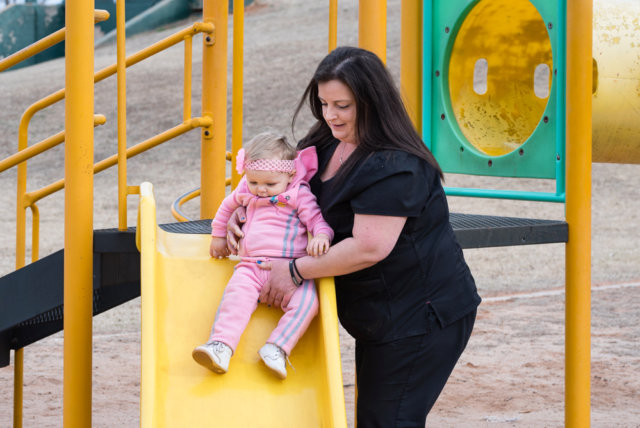

(Editor’s note: This story was authored by Whitney Bryen of Oklahoma Watch and appears here in accordance with the non-profit journalism organization’s republishing terms.)
Days after telling her boss she was pregnant, a 17-year-old fast-food worker in Oklahoma was fired.
An accounting employee was let go from an Oklahoma City pipeline inspection company, two days after requesting information about maternity leave.
A pregnant waitress in her first trimester said the owner of a Choctaw restaurant told her she was being fired because she was too emotional.
Forty years after Congress passed the Pregnancy Discrimination Act of 1978, which banned employers from discriminating on the basis of pregnancy or childbirth, the complaints from women keep rolling in.
Since 2014, about 50 complaints a year alleging pregnancy discrimination have been filed with the U.S. Equal Employment Opportunity Commission office in Oklahoma City, data requested by Oklahoma Watch shows. The office, which covers the state, investigates complaints against companies with 15 or more employees.
The state Attorney General’s Office handles complaints against companies with 14 or fewer employees, under the state’s Anti-Discrimination Act. Its Office of Civil Rights Enforcement doesn’t routinely count pregnancy discrimination complaints, but upon request, it reviewed 2017 data and identified four of them.
Federal officials say many incidents of pregnancy discrimination go unreported. Often women don’t know how or where to file complaints, are afraid to complain, or don’t know what is illegal. Many are low-wage workers who believe that filing a lawsuit or complaint will be too costly, stressful or time-consuming.
When they do complain, government agencies rarely sue the employer. Officials say the primary reason is discrimination is hard to prove.
In a time when the #MeToo movement has ignited outrage over sexual harassment, pregnancy discrimination remains in the shadows.
“I’m surprised we’re not talking more about this right now,” said Holly Waldron Cole, director of Oklahoma’s EEOC office. “It’s an issue that has been eclipsed by sexual harassment and the pay disparity issue that we keep talking about … Perhaps people don’t realize it’s a problem.”
‘We’re not breakable’
Although many pregnancy discrimination complaints involve firings, anti-discrimination laws also cover hiring, promotions, assignments, pay, benefits, training, leave and other conditions of employment.
Many cases arise because employers aren’t familiar with legal rights for pregnant women, government officials and women’s advocates said. Some employers also have misconceptions about women’s ability to perform well at work while pregnant.
Shamika Mack, a nurse practitioner at Integris Women’s Care, said most women can work throughout their pregnancy until they go into labor without jeopardizing their health or the health of their baby.
“We’re not breakable,” Mack said.
Midwest City resident Roya White says she was more emotional than usual when she was pregnant but had no intention of quitting her waitressing job at Old Germany Restaurant in Choctaw, where she had worked for more than seven years.
White said she had a healthy pregnancy and no problems performing her job duties. She planned to work until she gave birth and return as soon as possible to avoid falling behind on bills. But things didn’t work out as planned. White was in her first trimester when she said the restaurant owner fired her on Aug. 2, 2016, because she cried during a shift when a disgruntled customer yelled at her.
“He called me into his office after my lunch shift and said, ‘You know, I just really don’t think you’re going to be able to handle your pregnancy and this job,’” White said. “And he’s like, ‘I’m going to have to let you go.’”
White filed a complaint with the EEOC, but the agency did not find sufficient evidence to sue.
Reached by phone, the restaurant’s owner, Mike Turek, declined comment, except to note the EEOC finding.
White sued in federal court. But in late 2017, she failed to pay a $400 filing fee, which she said she couldn’t afford, and her case was dismissed. She told her attorney she was tired of fighting.
Waldron Cole, of the EEOC, will not comment on the specifics of any case. But she said it’s not up to an employer to decide what an employee can or cannot handle during pregnancy. Waldron Cole points to a 1991 U.S. Supreme Court decision, United Automobile Workers v. Johnson Controls, which protected a woman’s right to weigh and accept the risks of employment.
“They may have good intentions, but it’s not their call,” Waldron Cole said of employers. “Pregnant women get to decide what’s safe and unsafe for them and their babies.”
‘I was put on bed rest’
In 22 states and five cities, a woman has a right to maintain her job and to reasonable accommodations to her pregnancy and after childbirth, such as to express breast milk.
Oklahoma is not among those states. (And it has none of those cities.)
The legal gap presents health and financial risks for women, particularly those with healthy pregnancies.
Edmond resident Alee Tanabee worked as a pizza delivery driver last year until she was eight months pregnant, ignoring her doctor’s recommendation to avoid heavy lifting and take regular breaks. She was afraid of losing her job.
Tanabee was excused by her supervisor from making pizza dough because it required heavy lifting; the boss asked her co-workers to make the dough for her. But after a couple of days her co-workers stopped helping. This happened repeatedly, she said. Managers responded to some of her requests for accommodation but others were ignored, she said.
“I was never allowed regular breaks, and the only time I could sit was in the car during a delivery,” Tanabee said.
No federal law requires employers to make accommodations for women with healthy pregnancies, said Marcella Kocolatos, an attorney at A Better Balance, a New York-based legal group focused on work and family issues.
Women who have high-risk pregnancies or develop pregnancy-related complications may be entitled to reasonable accommodations under the Americans with Disabilities Act, Kocolatos said. But pregnant workers like Tanabee who simply need accommodations to stay healthy or prevent problems are less protected.
In Oklahoma, four bills have been introduced in the Legislature since 2016 to expand protections for pregnant employees; none passed.
Rep. Emily Virgin (D-Norman) introduced House Bill 3028 this year, which would require employers to make reasonable accommodations in job duties for pregnant women or new mothers and prohibit retaliation when workers make the requests. The bill cites accommodations such as “equipment for sitting, more frequent or longer breaks, periodic rest, assistance with manual labor, job restructuring, light duty assignments, modified work schedules and temporary transfers to less strenuous or hazardous work.”
Accommodations are not just about comfort, said Mack, the nurse practitioner. Doctors often recommend limits on lifting in order to protect muscles, frequent restroom breaks to prevent urinary tract infections, and food and water breaks to address low blood sugar and dehydration.
In her eighth month of pregnancy, Tanabee arrived at work to find that she again was expected to make her own pizza dough. She quit her job that morning and went to the emergency room because she wasn’t feeling well.
“I don’t know if it was directly related (to work), but at the end, my blood pressure was consistently too high, so I was put on bed rest and ended up delivering almost a month early,” Tanabee said.
She did not sue or file a complaint with the government because it wasn’t worth the stress on top of caring for a newborn, she said. (Oklahoma Watch is not naming the employer because Tanabee did not sue or file a complaint.)
Handling Complaints
When someone files a discrimination complaint, the EEOC or the Attorney General’s office notifies the accused employer and offers to conduct mediation. If that fails or is rejected, the agency investigates to determine if there is sufficient evidence to support the claim. If there is, a final attempt at mediation is made. If that fails, the agency can sue the company on behalf of the woman.
If evidence is lacking, the investigation is closed; the woman is notified that under the law she has 90 days to sue the employer.
In most cases, the EEOC or the state does not file a lawsuit. A key reason is that pregnancy discrimination is difficult to prove, often coming down to one person’s word against another, officials said.
Since 2012, when the state Office of Civil Rights Enforcement was created, the agency has not filed a single lawsuit against an employer related to pregnancy discrimination. At the EEOC, fewer than 5 percent of complaints of all types are resolved, and the percentage is likely lower for pregnancy discrimination claims, said Waldron Cole, of the EEOC.
“It’s just very challenging to prove, and that’s the state of the law that we have,” she said.
A check of federal court records and the national EEOC website identified one lawsuit filed by the EEOC in Oklahoma since 2010. In that case, the agency sued on behalf of an Oklahoma woman who alleged her employer, Kids R Us LLC, a child-care provider, demoted the woman from full-time assistant faculty director to part-time cook because she was pregnant. The case was settled in 2012 after the company agreed to pay her $75,000, notify its employees of the lawsuit, revise and communicate anti-discrimination policies and provide training to employees.
‘I just thought that was a part of life’
Even with cases that don’t end up in court, the complaint process can take months.
Heather Davis, of Oklahoma City, was fired from her job as a chiropractor’s assistant the day after her newborn daughter died of complications from premature birth.
Davis was being discharged from the hospital on Feb. 5, 2018, when her boss called to say that he had already hired her replacement and she could pick up her final paycheck that afternoon. She said she had been in the hospital less than a week and let her employer know daily what was going on.
“I was upset,” Davis said. “I just lost my daughter and then I just lost my job.”
On March 19, working with Oklahoma City attorney Leah Roper, Davis filed a complaint with the state Attorney General’s Office alleging wrongful termination. It could take at least six months before the results of the investigation, and months more if the state declines to take further action and Davis chooses to sue.
In the meantime, she is struggling financially, having lost her job. Her car was repossessed in March, which has made it difficult to get to and from her new job at a daycare center in Mustang.
Roper said because Davis had pregnancy-related complications, she is covered by both the state Anti-Discrimination Act and the Americans with Disabilities Act. The attorney said the best Davis can hope for is a settlement that helps her recover from her financial loss.
Still, a settlement doesn’t erase the emotional toll of what happened, Roper said. There is “the humiliation and embarrassment, the loss of the medical insurance, the getting behind on your bills,” all occurring as a woman and her family adjust to having a new child, she said.
For now, Davis said, she finds solace in the new job and is thankful her grandfather told her she had a legal recourse.
“I didn’t know it was wrong until someone said it was wrong,” Davis said. “I just thought that was a part of life.”





















